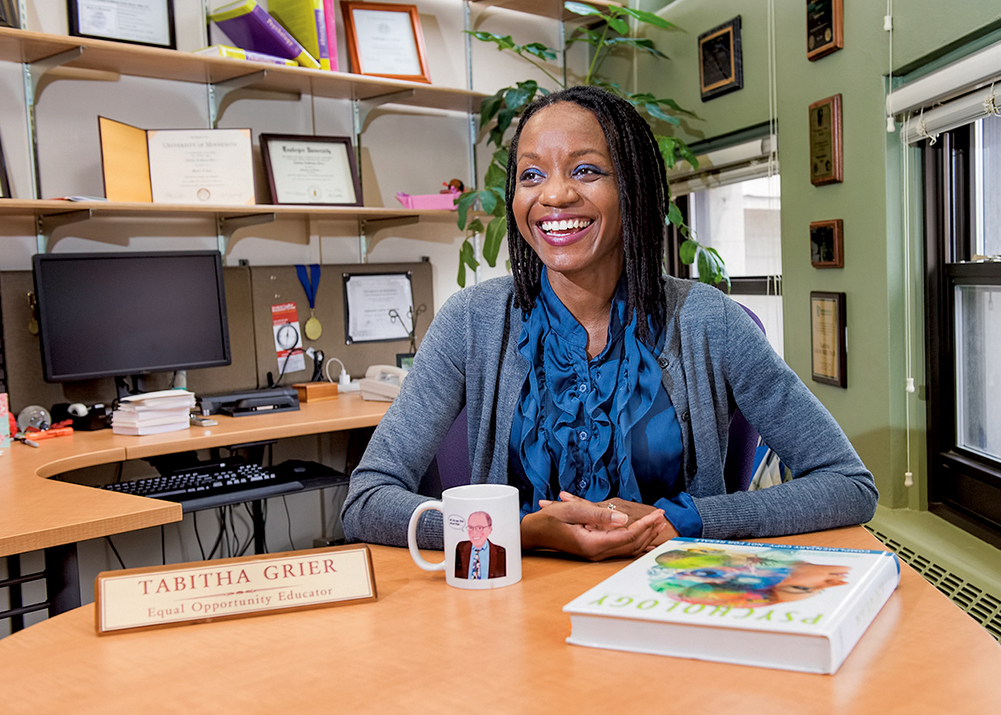It’s a room in Appleby Hall, anchored between the Mississippi River and Pleasant Street. There, every Wednesday at noon for 11 years, black students at the predominantly white University of Minnesota have found a space to be the majority for an hour.
Students came to call the African American Student Network “AFAM,” and many have said it’s kind of like a family.
“You could count on AFAM occurring if you needed a place to decompress from a stressful week or to process through a tragic moment,” says Amber Jones, who graduated with honors in 2015.
AFAM was created by Tabitha Grier-Reed, today an associate professor of family social science. At the time, she had just completed her Ph.D. in counseling and student personnel psychology. At AFAM, she confronted racial disparities head on, supporting students dealing with personal and academic problems as well as racially charged incidents.
“Students felt safe to speak their mind and speak their truth,” she says. “They felt connected to a community and validated.”
Through her research, Grier-Reed was also able to document AFAM’s effects on students, who have outperformed their more academically prepared peers.
Breaking barriers
Grier-Reed grew up in Alabama and attended Tuskegee University as a student in TRIO, a federally funded program designed to motivate and support students from underrepresented populations. She went on to become a TRIO McNair Scholar at the University of Knoxville, Tennessee. Then as a graduate student, she got to work as an adviser for TRIO programs at the University of Minnesota.
After her Ph.D., Grier-Reed joined the faculty, helping to forge a first-year program and undergraduate curriculum in CEHD that has led the University in retaining a diverse student body, including a high percentage of students who are first in their families to attend college.
Inside the classroom, Grier-Reed is known for engaging and challenging students through discussion techniques and assignments that open up topics and connect to lived experiences and communities.
“There was nothing about Tabitha’s teaching that resembled a lecture,” says Emily Karp, now in medical school, who vividly remembers how Grier-Reed brought concepts and information to life through videos, stories, and group projects that allowed undergraduates to conduct original research.
Outside the classroom, Grier-Reed identifies ways to break down barriers to college success. She’s created ways for undergraduates to present their research at conferences. And she has come full circle, serving as a TRIO McNair faculty mentor to undergraduates exploring research and the prospect of graduate school.
Grier-Reed is also a graduate student adviser and excited about their work. She cites one counseling psychology student focusing on high-need rural communities that don’t have adequate access to mental health care.
For her own research, Grier-Reed is attracted to the new prevention science program in family social science, which focuses on preventing problems and building resilience. She wants to advance restorative practices and prevention related to racial discrimination for cultures, families, and schools.
In everything, Grier-Reed’s work is marked by excellence. In 2016, she received the University’s prestigious Morse-Alumni Undergraduate Teaching Award, citing her commitment to inclusive pedagogy, intellectual rigor, supportive peer advising, and research.
“I am committed to social justice and equity,” she says. “That’s who I am as a teacher and who I am as a person. Better equipping students to contribute to our multicultural democracy as part of an informed citizenry and agents of social change is at the core of what I do.”
Learn more about Tabitha Grier-Reed and the Department of Family Social Science.
Photo by Patrick O’Leary | Winter 2017
